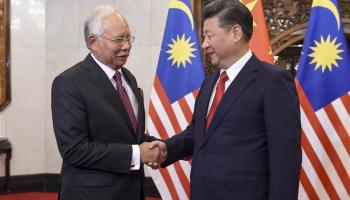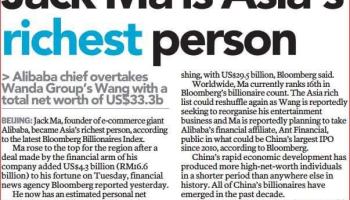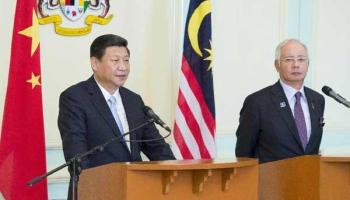PUTRAJAYA: Malaysia will remain an unwavering and principled friend to China during “moments of triumph and times of trial”, says Datuk Seri Anwar Ibrahim
The Prime Minister said Malaysia and China have long stood shoulder to shoulder – not merely as comprehensive strategic partners, but as steadfast friends.
“Malaysia values this consistency. Malaysia will remain an unwavering and principled friend to China, guided by the wisdom of history and the promise of the future,” he said in a speech during the official dinner in honour of President Xi Jinping last night.
At a time when multilateralism is under tremendous strain, as certain nations abandon the principle of shared responsibility and others question long-standing commitments, Anwar said China’s global initiatives seem to offer a new lease on hope.
“What we are witnessing today is not an honest reckoning with the imperfections of globalisation, but a retreat into economic tribalism.
“Market access is being weaponised. What was once a multilateral covenant for shared growth now buckles under the weight of arbitrary disruption and unilateral whim.
“Amid this turbulence, China has been a rational, strong and reliable partner,” he said
Anwar said Malaysia’s foreign policy was shaped by a “clear-eyed” vision of its interest and the principle of Asean centrality.
“We do not simply favour cooperation over confrontation (but) we embrace it. We do not merely prefer respect over rivalry, we uphold it.
“And we choose dialogue, not simply because it chose us, but as a cornerstone of lasting peace and prosperity,” he said.
The Prime Minister said that during these trying times, the world yearns for steadiness, reliability and purpose.
“We see this in China’s conduct. Malaysia acknowledges such steadiness with quiet recognition and remains conscious not only of the calm it has brought, but of the hope it may continue to offer,” said Anwar.
He said under the leadership of Xi, China has outlined a series of global initiatives that reflect a distinctive worldview.
He said the Belt and Road Initiative reimagines connectivity not as a network of roads and rails, but as a framework for cooperation.
“The Global Development Initiative underscores the importance of inclusive progress.
“The Global Security Initiative calls for peace through dialogue,” he said.
“Each of these ideas reflects a broader aspiration of what President Xi has described as a community with a shared future for mankind.
“This brings to mind the famous saying of Confucius, that ‘within the four seas, all men are brothers’,” added Anwar, who said the phrase in Chinese.
He said he also hoped that Malaysia and China would endure a long-lasting relationship.
Malaysia and China deepen partnership with major deals on trade, tech and tourism
PUTRAJAYA: Malaysia and China have signed 31 memoranda of understanding (MOUs), notes and cooperation agreements with the highlight being a mutual visa exemption for travellers between the two countries.
Currently, Malaysians can travel to China visa-free until Dec 31 this year, while Chinese nationals enjoy visa-free travel to Malaysia until Dec 31 next year.
The exemption was in conjunction with the 50th anniversary of diplomatic relations between Malaysia and China.
Other strategic areas of cooperation include security, development, trade, transport, agriculture, education and digital technology.
The exchange of documents, which took place at the Seri Perdana Complex yesterday, was witnessed by Prime Minister Datuk Seri Anwar Ibrahim and Chinese President Xi Jinping.
Among the key agreements signed with ministries and agencies is one concerning giant pandas, comprising an MOU on the Cooperative Research Agreement for the International Conservation of Giant Pandas.
Additionally, under the Investment, Trade and Industry Ministry, three MOUs were signed, including one aimed at upgrading the China-Malaysia “Two Countries, Twin Parks” initiative.
Also, three MOUs were inked under the Tourism, Arts and Culture Ministry, including tourism and media cooperation between Xinhua News Agency from China and Malaysia Tourism Promotion Board.
There was also an exchange of notes between China and Malaysia on the establishment of a joint foreign and defence dialogue.
Under the Transport Ministry, Malaysia and China signed an MOU between the National Railway Administration of China and the Transport Ministry to strengthen cooperation in the railway sector.
Meanwhile, the Digital Ministry and China’s National Development and Reform Commission inked an MOU on the digital economy, while the Domestic Trade and Cost of Living Ministry signed an agreement on cooperation in the field of intellectual property.
Several MOUs were also signed with media groups and universities, including one on bilateral cooperation between China’s People’s Daily and Star Media Group Bhd.
At the start of a bilateral meeting, Anwar remarked that Malaysia remains committed to working together with China in various areas, including economy, trade, and emerging technologies such as artificial intelligence.
The Prime Minister stated that China is not only a close neighbour but also an important partner through the comprehensive strategic partnership, which reflects the deep trust and long-standing cooperation between the two nations.
Recalling his previous visit to China, Anwar said: “As I have said to you when we met in China, President Xi exemplifies a new type of persona, a leader who talks about growth and investment and economic advancement.
“He also talks about eliminating poverty and has proven his success, more importantly about shared prosperity and civilisation, which is hardly expressed by any modern leader in this world.
“We admire your tenacity and for that Malaysians welcome you, President Xi, not only as president of a great country, the President of China, but as a true friend.”
In his remarks, Xi announced a bold and shared vision for the future of China-Malaysia relations, pledging to elevate the partnership to unprecedented strategic heights.
He said both countries are committed to forging an even stronger bond, promising mutual benefits and enhanced regional prosperity.
“This marks my return to Malaysia after 12 years, during which the nation has achieved remarkable progress in its development.
“Your Madani government is steadily becoming a promising reality, and I extend my heartfelt congratulations,” he said.
Xi recalled the pivotal establishment of diplomatic relations between China and Malaysia over five decades ago, which defied the tensions of the Cold War.
He also highlighted the solidarity exhibited by both nations during the Covid-19 pandemic.
“Today, our two countries are working in unity to jointly build a community with a shared future. China-Malaysia relations are now entering a new golden era,” he said
Related post|:
May the Ship of China-Malaysia Friendship Sail Toward an Even Brighter Future
Related stories:
- Xi’s visit helps uplift economic sentiment
- Elevating Malaysia-China ties
- Safeguarding our ‘Asian family’
- Kuantan industry flourishes under Chinese investments
- A delicious taste of Malaysia for Xi
- China-Malaysia ties to buoy exports, tech sector



















 Pivotal moment: The PM in talks with President Xi Jinping during a meeting at Diaoyutai state guesthouse in Beijing.
Pivotal moment: The PM in talks with President Xi Jinping during a meeting at Diaoyutai state guesthouse in Beijing.








